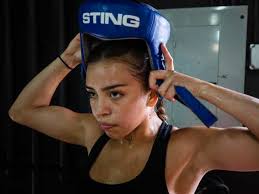 If you are reading this you have probably already overcome the fear that is commonly associated with starting a contact sport. The anxiety of walking into a new gym, going to your first class, and putting on the gloves for the first time have all been conquered. You may have trained hard for a few months, learned the basics of offense and defense, learned to work the heavy bag, and hopefully your conditioning is reflected by all this hard work. By this time you should feel proud and accomplished with all that you have learned and the fears you have pushed past. Then your coach asks you… “are you ready to start sparring”?
If you are reading this you have probably already overcome the fear that is commonly associated with starting a contact sport. The anxiety of walking into a new gym, going to your first class, and putting on the gloves for the first time have all been conquered. You may have trained hard for a few months, learned the basics of offense and defense, learned to work the heavy bag, and hopefully your conditioning is reflected by all this hard work. By this time you should feel proud and accomplished with all that you have learned and the fears you have pushed past. Then your coach asks you… “are you ready to start sparring”?
Some people hear this and are filled with excitement. For others, it is a moment of renewed fear and anxiety. For this reason I would like to share some simple tips and techniques to help new students make their first sparring sessions enjoyable and a good learning experience.
Three Tips for Your First Sparring Match
#1 Plan on Learning Not Winning
Your first time sparring should be an experience, not an assessment. This is not the time to figure out if what you have learned works or how tough you are. Think of this first experience more like an exciting amusement park ride where you will be a lil nervous but excited and glad that you did it. Don’t judge yourself based on your overall performance. For most new students, technique flies out the window the first time they spar. A successful first session is not one where you landed more strikes but rather one that leaves you wanting to do it again.
#2 Keep Your Eyes on Your Opponent
Listen to your coach but don’t look at them. Our attention and body go where we look. Focus your eyes on your opponent’s chest and try to make reads from there. If your coach yells out instructions, don’t let it distract you from the person in front of you. Protect yourself at all times when you are in the ring.
#3 Breath Out
Breathing in is easy, breathing out is hard. Learn to exhale on every strike. Let the air out and your body will do the rest. You don’t need to think about inhaling… your body will not let you forget this part. However, it is very common to get tense and hold your breath when you are nervous. Holding your breath will exhaust you. It is not uncommon for people to find themselves completely winded after a sparring round even though they have trained extensively on mitts and heavy bags.
Three Techniques for Your First Sparring Match
#1 Work the Jab and Defend the Jab
If there is one thing to focus on for your first sparring session, it is the jab. Practice it the way you were taught by your coaches. Get comfortable throwing the jab as a single, double or triple. Use the jab to set up your power hand, bent arm blows, combos and other techniques you are comfortable with. Don’t forget they will be using the jab too. Catch, parry, slip or block the jab just like you learned in training and expect to see it a lot.
#2 Work the Body
The head is a small target and when covered with 16oz gloves, becomes very difficult to hit. The body, on the other hand, is a much bigger target, moves less and is harder to cover. Changing the levels of your attacks will open up other targets and keep your opponent guessing. Most beginners start out as head hunters but don’t get stuck in this trap. You will have more successful moments if you use body attacks as well.
#3 Move After You Hit
Once you do find yourself having some success, get out. Do not stay in the same spot and wait for the response. When you hit someone… they want to hit you back. Try not to give them this opportunity. Put a stamp on your success by using your guard, footwork, and head movement to get out safely after you land your combos.
Conclusion
Being nervous the first time you spar is totally normal. In fact it would be a little strange to not feel anything the first time getting in the ring against an opponent. However, if done correctly with the right partners and the right coaching it should be an exciting and enjoyable experience that leaves you wanting more. Don’t be hard on yourself. Don’t judge your performance. Don’t try to win by hitting them more than they hit you. You win by conquering your fear, being a good sparring partner, and making sure both of you leave looking forward to your next match.
Keep up the good work everyone and we look forward to seeing you in class. If you are interested in getting started with boxing or Muay Thai, call us today to set up a free lesson 503-235-3435.



